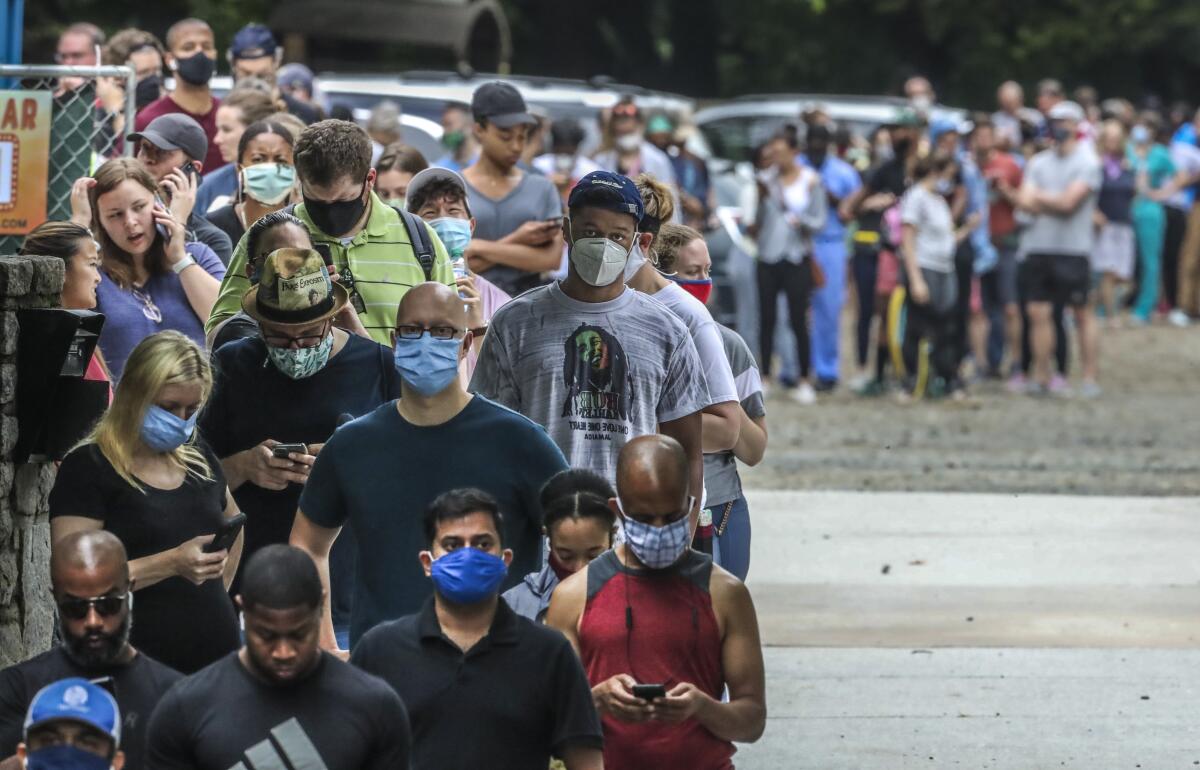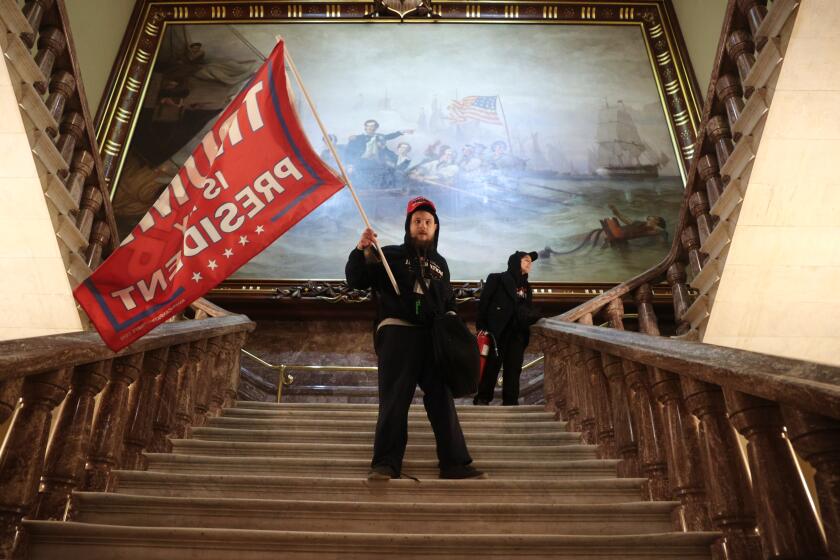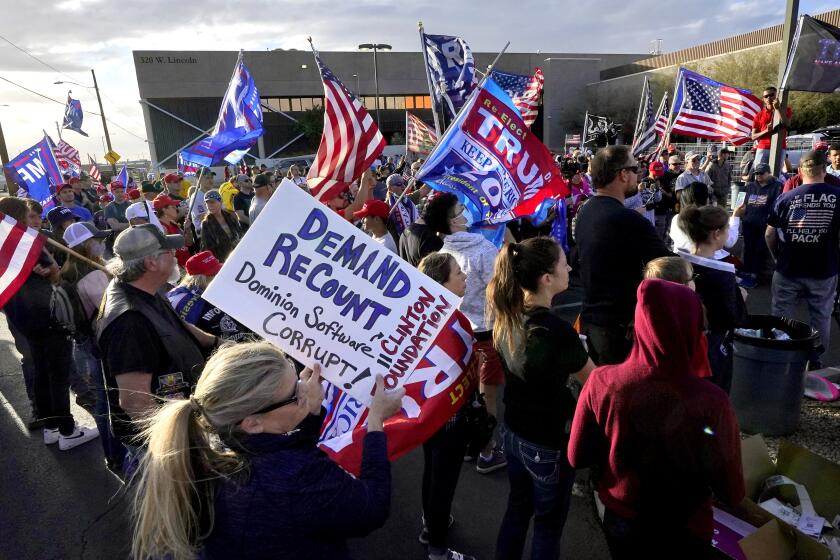As the For the People Act voting bill is debated, Republicans in dozens of states push restrictions

- Share via
WASHINGTON — A landmark federal voting rights measure debated in a Senate committee Wednesday comes as Republicans in dozens of statehouses are pushing local legislation that would make it harder for many Americans to vote.
The federal For the People Act, which includes provisions making it easier to register and to cast ballots, is the voting rights measure advocates have long desired.
But the stakes for it passing the Senate shot up after the 2020 presidential election, when Republicans in more than 40 statehouses introduced legislation that advocates fear would suppress the vote and shrink democracy. Despite no evidence of widespread fraud, Republicans are making their calls for restrictions under the banner of “voting integrity.”
That familiar rhetoric was infused into the national dialogue by former President Trump, who had long said that the only way he could lose an election was through cheating; he spent much of 2020 attacking mail voting, claiming that the election would be “rigged.” And after losing the election to now-President Biden, Trump continued to claim it was stolen, a falsehood that led hundreds of his followers to violently attack the Capitol as Congress was certifying results.
After months of election-fraud lies and years of bellicose rhetoric, Trump gets blame from both parties for his supporters’ violent bid to subvert the election result.
In eight battleground states, including those in which Trump’s allies filed more than 60 lawsuits, there was “no evidence of fraud, manipulation, or uncorrected error,” according to a report by the nonprofit MITRE Corp.
But Trump’s baseless assertions still resonate, with about 70% of Republicans believing the presidential election was invalid, polls in the months after found. And Republican politicians at the federal and state level have amplified messaging about election fraud.
Many of more than 250 proposals moving through state legislatures are “fueled by voter fraud lies,” said Wendy Weiser, vice president of the Democracy Program at the Brennan Center for Justice, a think tank at New York University Law School.
“It’s the same lie that fueled the Capitol insurrection,” she said.
The outlines of these proposals are not new, Weiser said. Some states are looking to add stricter voter identification requirements and make it easier to purge rolls. Both are tactics that have long been used to suppress voting, Weiser said.
But there is “certainly something new and different about this time,” Weiser said. The efforts “just weren’t as intense and widespread before.”
Conservative advocacy groups such as Heritage Action have rallied around the state-level efforts.
“After a year when voters’ trust in our elections plummeted, restoring that trust should be the top priority of legislators and governors nationwide,” Jessica Anderson, executive director of the nonprofit, said in announcing the group’s $10-million push to support the GOP-led proposals. The group has called the federal voting measure the “Corrupt Politicians Act,” saying it would remove election security protections and usurp local authority by automating voter registration and restoring rights to felons who served their sentences.
The measure, which passed the House of Representatives on March 3 in a near party-line vote, would also require presidential candidates to disclose their income tax returns and ban partisan gerrymandering. It is unlikely to pass the evenly split Senate under filibuster rules that allow the minority party to block legislation unless a measure has the support of 60 senators.
After ex-President Trump’s baseless claims of voting fraud, Republican lawmakers across the U.S. push to change election rules. Arizona leads the way.
Throughout the committee hearing Wednesday, Republican senators railed against the proposal. Senate Minority Leader Mitch McConnell (R-Ky.) called it a “partisan power grab” and said, “This is clearly an effort by one party to rewrite the rules of the political system.”
Senate Majority Leader Charles E. Schumer (D-N.Y.) criticized his Republican colleagues and blasted some of the state-level proposals: “I would like to ask my Republican colleagues: Why are you so afraid of democracy? Why, instead of trying to win voters over that you lost in the last election, are you trying to prevent them from voting?”
After ex-President Trump’s baseless claims of voting fraud, Republican lawmakers across the U.S. push to change election rules. Arizona leads the way.
Here are some of the proposals winding their way through state legislatures:
Restrict voting by mail
Many states expanded vote by mail during the 2020 primary and general elections amid the COVID-19 pandemic, as health officials urged people to limit in-person interactions to slow the spread of the deadly virus. Some states including Georgia, Arizona and Florida already had no-excuse mail-balloting practices.
During the November presidential election, some 46% of U.S. voters cast absentee or mail-in ballots, according to the nonpartisan Pew Research Center.
Since then, scores of proposals at the state level — including Georgia and Arizona and Florida — would restrict vote by mail, according to the Brennan Center.
In Florida, turnout for the 2020 presidential election was the highest in nearly three decades, with millions of voters, including candidate Trump, choosing their leaders by mail. For the first time since 2014, Democratic voters casting absentee ballots outnumbered Republicans in a general election.
Republican Gov. Ron DeSantis heralded the 2020 vote as the “smoothest, most successful election of any state in the country.”
Yet DeSantis made that statement as he called for changes he said would “safeguard the sanctity of Florida elections.”
“We should not rest on our laurels,” he said.
DeSantis’ proposal would bar counties from sending ballots to people unless requested and require voters to ask for an absentee ballot every election year. Current law stipulates vote-by-mail requests be valid for two general election cycles. His proposal also would ban drop boxes being used for ballot return.
The bill has drawn criticism from Florida ACLU political director Kirk Bailey, who said in a statement that the proposals would make “administering elections in Florida more burdensome and unnecessarily difficult.”
The state Democratic Party’s executive director, Marcus Dixon, has accused DeSantis and his allies of being “more interested in holding on to power at all costs than ensuring fair access to our democracy.”
“They want to limit vote-by-mail because they know that more people voting threatens their power,” Dixon said in a statement, “so they are turning back to the Trump Republican authoritarian playbook: voter suppression and incendiary rhetoric about election integrity.”
Limit voter registration
More than 10 states have had measures that would add restrictions to voter registration, including Texas, New Hampshire, Virginia, Georgia, Hawaii and Alaska.
An Alaskan state senator has proposed eliminating a law passed by voters in 2016 that automated voter registration when Alaskans join a state fund dividend that awards investment earnings of mineral royalties. Instead, Alaskans would have to opt in to be registered.
Republican state Sen. Mike Shower, in a statement as sponsor of the bill, cited “election integrity” as a reason to change elections law.
But Shower’s proposal would “overturn the will of Alaskans” who backed the ballot measure just five years ago, Michael Garvey, advocacy director of Alaska’s ACLU, said in a statement. Garvey said that if lawmakers intend this provision to address the state’s voter rolls, “it should pursue less restrictive and more targeted means of doing so.”
Voter roll purges
More than 10 states have had lawmakers propose legislation that would purge voter rolls, including in New Jersey, New Hampshire and Arizona.
In Arizona, after Biden became the first Democrat towin the state in 24 years, and by fewer than 11,000 votes, Republicans championed a bill that would have made it easier to remove voters from a “permanent early voting list.”
Under the measure, voters would be booted from the list if they hadn’t cast an early ballot in both the primary and general elections for two consecutive election cycles for which there was a federal, legislative or statewide race on the ballots.
The list consists of more than 3.2 million voters, and more than 200,000 could be affected if this bill is enacted, according to figures to provided by Sophia Solis, a spokeswoman for Arizona’s Democratic secretary of state. About 46,000 are Republicans, 2,300 are Libertarians and 63,000 are Democrats.
Under the bill, voters could appeal their notice of removal if they return a notice within 30 days of notice. But this provision is problematic for many Native Americans who live on reservations with unreliable postal service, said Rosemary Avila, a campaign manager for All Voting Is Local’s Arizona chapter.
Avila said it’s clear this Arizona bill is “a direct response to the 2020 election and the increase in turnout in communities that turned out and make their voices heard.”
Limit early voting
At least 10 states have had lawmakers propose limiting early voting, including Tennessee, New Hampshire and Arizona.
Georgia made headlines for long waits outside polling places in 2020, including the initial days of early voting for the general election. More than 3.9 million Georgians voted early or cast absentee ballots in the general election, a vast majority of the votes in the presidential race. And more than 65,000 people in 16 of Georgia’s 159 counties cast their ballot for president on a Sunday, according to Georgia’s secretary of state office. Biden won the state by about 12,000 votes.
Trump’s was the first Republican presidential loss in Georgia since 1992, and his baseless claims about the election there were followed by the GOP losing both of the state’s U.S. Senate seats.
After the 2020 vote, Republican legislators aimed to cut back early voting on Sundays, which would directly affect “Souls to the Polls,” a popular get-out-the-vote initiative with Black churchgoers, in which caravans of cars head to polling places after church services.
Voting rights advocates decried the proposal. Cliff Albright, co-founder of Black Voters Matter Fund, said it was “directly targeting Black voters and Black churches.”
Following the outcry, the bill has been amended somewhat to change weekend voting in runoff elections. The measure would still slash the number of drop boxes available and criminalize giving food and water to people standing in line to vote.
Republican state Rep. Barry Fleming, who is the chair of a new Special Committee on Election Integrity, said in a February hearing that electoral changes are meant to ensure “voting is secure, and that someone’s vote cannot be stolen.”
Schumer pointed to Georgia in written statements highlighting the importance of the Senate voting rights bill.
“Some of these voter suppression laws in Georgia and other Republican states smack of Jim Crow — Jim Crow in the 21st century, rearing its ugly head once again,” Schumer said.
More to Read
Get the L.A. Times Politics newsletter
Deeply reported insights into legislation, politics and policy from Sacramento, Washington and beyond. In your inbox twice per week.
You may occasionally receive promotional content from the Los Angeles Times.













